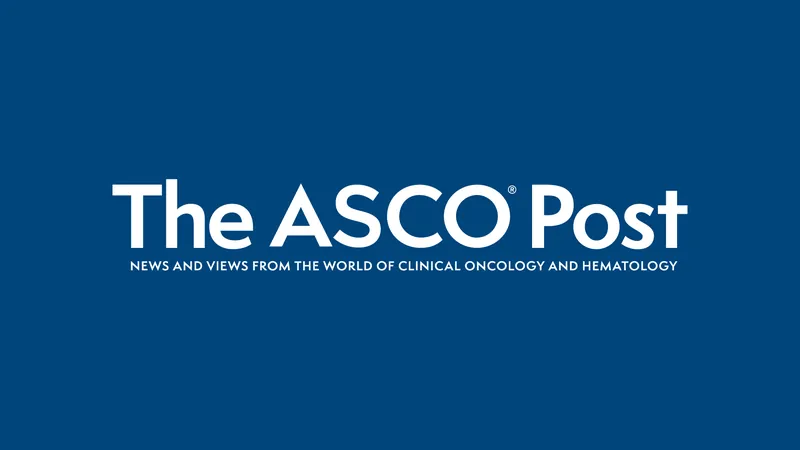
Breakthrough Neoadjuvant Therapy Shows Promise for Triple-Negative Breast Cancer Patients!
2024-11-09
Author: Jia
Breakthrough Neoadjuvant Therapy Shows Promise for Triple-Negative Breast Cancer Patients!
In a significant development for early-stage triple-negative breast cancer treatment, the phase III KEYNOTE-522 trial has unveiled remarkable outcomes from combining neoadjuvant pembrolizumab with chemotherapy. Dr. Peter Schmid revealed these findings at the ESMO Congress 2024, showcasing a notable overall survival advantage. The study, which included 574 women, demonstrated a hazard ratio of 0.66 and a 5% increase in survival rates over five years—an impressive 86.6% compared to 81.7%. This trial brings hope to patients, as benefits were consistent across various subgroups, independent of tumor characteristics. The FDA had already recognized pembrolizumab’s potential in high-risk patients, thus solidifying its role in enhancing treatments for this aggressive cancer subtype.
WHO Moves to Rethink Mobile Phone Cancer Risks
In a surprising turn of research, a recent review commissioned by the World Health Organization (WHO) has found no actionable link between mobile phone usage and brain cancer risks. Analyzing 63 studies spanning from 1994 to 2022, researchers focused on radiofrequency exposures from different devices. Despite the rise of mobile technology, brain cancer rates remained stable. This revelation could prompt the WHO to reassess the current 'possibly carcinogenic' classification of mobile phone radiation, with new evaluations anticipated by early 2025.
Disappointment for Renal Cell Carcinoma Patients: TiNivo-2 Trial
Another pivotal study, the phase III TiNivo-2 trial, has raised concerns for patients battling metastatic renal cell carcinoma. Published in The Lancet, the trial assessed the effectiveness of combining nivolumab and tivozanib. Involving participants from 16 countries, it showed no survival benefit from the combination therapy when stacked against tivozanib alone, with median progression-free survival recorded at 5.7 months versus 7.4 months for tivozanib solo. The findings underscore the limited role of immune checkpoint inhibitors in this context, suggesting a potential redirection toward more straightforward treatment protocols for these patients.
Colorectal Cancer Trial Shows High-Dose Vitamin D3 Lacks Benefits
The SOLARIS trial, conducted at Dana-Farber Cancer Institute, has also dashed hopes for the addition of high-dose vitamin D3 in treating untreated metastatic colorectal cancer. The study revealed no advantage in progression-free survival compared to standard doses. Despite a rigorous follow-up of 20 months with over 450 patients involved, the findings indicate that high-dose vitamin D3 is not necessary for managing this condition, though there are hints that it could benefit left-sided disease cases, meriting further scrutiny.
Alarm Bells for Breast Cancer: Rising Rates among Key Demographics
Alarmingly, the American Cancer Society's 2024 Breast Cancer Statistics report highlights a worrying trend: breast cancer diagnosis rates have risen by 1% annually from 2012 to 2021, striking hardest among women under 50 and Asian American/Pacific Islander women. Despite an overall decline in mortality rates by 44% since 1989, certain groups, notably American Indian and Alaska Native women, have not seen the same improvements, revealing significant disparities in access to critical screening and treatment post-diagnosis.
Breakthroughs in Pancreatic Ductal Adenocarcinoma Adjuvant Therapy
In an eye-opening retrospective cohort study, researchers have identified therapeutic trends in resected pancreatic ductal adenocarcinoma. Analyzing over 1,000 patients, it became clear that adjuvant chemotherapy notably benefits those with node-positive disease and elevated CA19-9 levels, yielding a median overall survival expansion of 34.4 months. However, concerning findings also surfaced, revealing substantial instances of both under-treatment and over-treatment among patients, signifying a pressing need for improved treatment protocols and more comprehensive trials.
African Men Face Unique Prostate Cancer Risks
Highlighting the importance of tailored cancer screening, a groundbreaking study in Nature Genetics focuses on genetic risk factors leading to higher prostate cancer incidence among African men. This extensive research spans almost 8,000 participants across African nations, uncovering three previously unidentified genetic loci. This pivotal work aims to sharpen understanding and treatment of prostate cancer, emphasizing that one-size-fits-all approaches are inadequate, especially among diverse populations.
New Hope on the Horizon: Puxitatug Samrotecan in Cancer Treatment
Finally, the innovative antibody-drug conjugate puxitatug samrotecan has emerged from a first-in-human trial with promising results. Targeting the B7-H4 protein—associated with poor prognoses—this drug has shown a manageable safety profile and early signs of efficacy in heavily pretreated patients suffering from advanced solid tumors. Involving 47 participants, 20.5% achieved partial responses, and despite some adverse treatment-related events, only a minimal number dropped out due to toxicity. Ongoing trials will elucidate its potential across various cancer types, potentially revolutionizing treatment options for patients in dire need.
Conclusion
As these studies unfold, the cancer treatment landscape is continuously evolving, paving the way for promising new therapies and a deeper understanding of treatment disparities across populations.




 Brasil (PT)
Brasil (PT)
 Canada (EN)
Canada (EN)
 Chile (ES)
Chile (ES)
 España (ES)
España (ES)
 France (FR)
France (FR)
 Hong Kong (EN)
Hong Kong (EN)
 Italia (IT)
Italia (IT)
 日本 (JA)
日本 (JA)
 Magyarország (HU)
Magyarország (HU)
 Norge (NO)
Norge (NO)
 Polska (PL)
Polska (PL)
 Schweiz (DE)
Schweiz (DE)
 Singapore (EN)
Singapore (EN)
 Sverige (SV)
Sverige (SV)
 Suomi (FI)
Suomi (FI)
 Türkiye (TR)
Türkiye (TR)